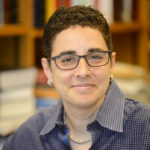11.12.21 —In support of its public interest mission and commitment to eliminating racism, Northeastern University School of Law is pleased to announce that four faculty members have been awarded inaugural Racial Justice Faculty Fellowships. The fellowships will be used to promote faculty research and scholarship on issues of racial justice and/or structural racism, broadly defined. Fellows will work on projects, participate in related conferences and publish related articles and other commentary. The competitive fellowships are awarded for one year.
“I am thrilled to support this impressive cohort of faculty fellows to promote the cause of racial justice,” said Dean James Hackney. “The research interests of this group are incredibly diverse and these exciting projects will bolster the work our new Center for Law, Equality and Race (CLEAR) is doing to enhance access to justice, racial equity and reform.”
The 2021-2022 recipients:
 Libby Adler
Libby Adler
Professor of Law and Women’s, Gender and Sexuality Studies
Professor Libby Adler’s research project is tentatively titled “Regulating the Domain Called Beauty.” It investigates contrasting law reform trajectories for LGBTQ populations in the US and Cuba. Lacking the higher order rights on which US advocates have relied, Cuban progress has occurred on socialist terms, principally in public health and education. The individual rights-orientation of US advocacy has resulted in racial and economic disparity within the LGBTQ community. This project will inquire into the redistributive methods of the Cuban state and the extent to which they have led to more broadly allocated benefits across the LGBTQ population, particularly in the face of global economic forces since the end of the Cold War. The study traces the multidetermined process of LGBTQ legal advancement under socialist conditions and investigates the relationship between LGBTQ progress and political economic structure.
 Stephanie Hartung
Stephanie Hartung
Teaching Professor and Program Administrator, Legal Skills in Social Context
Professor Stephanie Roberts Hartung is the principal investigator for a Tier 1 Northeastern University grant-funded interdisciplinary research project studying the cradle-to-prison (C2P) pipeline. As an inaugural Racial Justice Faculty Fellow at Northeastern Law, Professor Hartung is continuing her C2P research, conducting and overseeing an ongoing survey of incarcerated people in Massachusetts. The survey focuses on systems involvement and childhood experiences of incarcerated people to better understand the workings of the pipeline in Massachusetts, including the disparate impact on BIPOC and other marginalized communities. The survey was designed to address data gaps — particularly related to the child welfare system — revealed in the early stages of the C2P Project research. Phase I data has been collected and analyzed based on nearly 300 surveys completed during the fall of 2020. Phase II of the survey is currently underway and is projected to include 500 to 700 additional survey participants. Analysis of the data will support policy interventions to disrupt the pipeline and mitigate mass incarceration in Massachusetts. The Racial Justice Fellowship will further support Professor Hartung’s publication and presentation of the C2P survey findings.
 Michael Meltsner
Michael Meltsner
George J. and Kathleen Waters Matthews Distinguished University Professor of Law
Professor Michael Meltsner is completing his novel, Mosaic: Who Paid For The Bullet? The book tells the story of a 1960s murder of a charismatic women doctor who tried to open a racially segregated healthcare system in a large Southern city and her civil rights lawyer-lover’s revenge. The book is inspired by actual events — the struggle to end hospital segregation and denial of care — which Professor Meltsner participated in at the time as the primary lawyer who handled health care cases at the NAACP Legal Defense Fund. Two years ago, a prominent medical researcher asked Professor Meltsner to investigate the murder. He found official records had gone missing, potential witnesses all dead and the trail cold, but was convinced that the crime that occurred at the intersection of law, hate, greed and government intervention had to be brought to life. Hence this “true crime” novel. It will be published by Quid Pro Books.
 Deborah Ramirez
Deborah Ramirez
Professor of Law and Faculty Co-Director, Center for Law, Equity and Race
Professor Deborah Ramirez is conducting research rated to police accountability. It is an unfortunate fact that the number of civilians shot by police has increased over time. Further, the rate of fatal police shootings among people of color has been much higher than for their white counterparts. These fatal shootings have served as a catalyst for Black Lives Matter and other civil right groups. In response, many scholars have been focused on police accountability and how to hold police accountable for theses deadly encounters. Professor Ramirez’s research focuses not merely on reactive accountability for past shootings, but also on how to prevent, detect and deter reckless policing before it escalates into a deadly encounter. With funding from the Racial Justice Faculty Fellowship, she is implementing empirical research in order to introduce a dataset of how municipalities settle police misconduct complaints. For this, her team is targeting and studying how police settlements trend for police misconduct in small, medium and large cities. This data is crucial to providing a workable police accountability model using professional liability insurance and is also a means of understanding trends related to police misconduct.
About Northeastern University School of Law
The nation’s leader in experiential legal education since 1968, Northeastern University School of Law offers the longest-running, most extensive experience-based legal education program in the country. Northeastern guarantees its students unparalleled practical legal work experiences through its signature Cooperative Legal Education Program. More than 1,000 employers worldwide in a wide range of legal, government, nonprofit and business organizations participate in the program. With a focus on social justice and innovation, Northeastern University School of Law blends theory and practice, providing students with a unique set of skills and experiences to successfully practice law.